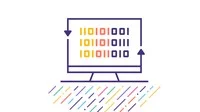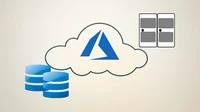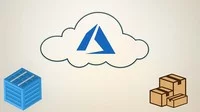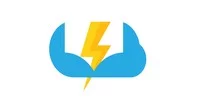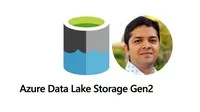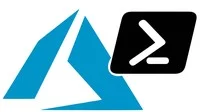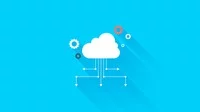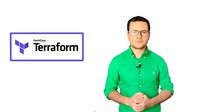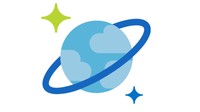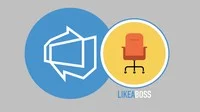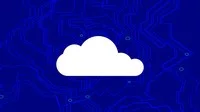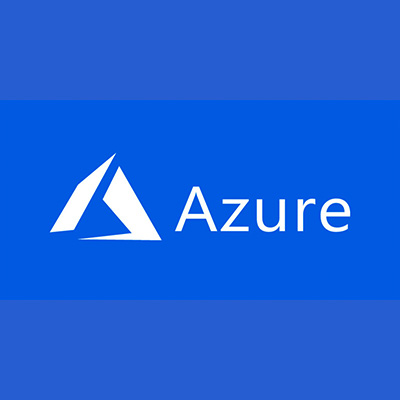
In this article, you can find Azure online courses for all levels.
Microsoft Azure, often referred to as Azure is a cloud computing service operated by Microsoft for application management via Microsoft-managed data centers. It provides software as a service (SaaS), platform as a service (PaaS) and infrastructure as a service (IaaS) and supports many different programming languages, tools, and frameworks, including both Microsoft-specific and third-party software and systems.
Azure, announced at Microsoft’s Professional Developers Conference (PDC) in October 2008, went by the internal project codename “Project Red Dog”, and formally released in February 2010, as Windows Azure before being renamed to Microsoft Azure on March 25, 2014.
Below we have prepared 15 online courses for all levels to learn Azure.
Azure Data Factory Workshop – Real World Project & Use Cases
Amit Navgire via Udemy
Learn how to use Data Factory from scratch to set up automated data pipelines to and from on–premises and cloud sources. Hands on project based workshop where students will learn the concepts of azure data factory by implementing a project covering real world scenarios. At the end of the course, students will be able to get started and build medium complex data driven pipelines in data factory independently and confidently. This workshop is for Data Engineers, BI Developers, ETL Developers, Data & Analytics Professionals. Also ideal for beginners with little or no knowledge of Azure or Azure Data Factory & for Freshers/Professionals who want to make a career in Azure.
★★★★★(5-star rating)
Become an Azure Container Hero
Jamie Mack via Udemy
This course isn’t just a bunch of theory on how we think you should use containers on Microsoft Azure. This is a hands on deep dive into how to deploy containers on the Azure Platform. Docker is at the heart of creating containers, we are going to teach you how to configure your mac or windows machine to build containers locally. We have developed a simple container and we will teach you to do the same. These will be used to deploy to each of the Azure Services. The Azure Services we are going to cover are: Azure Container Instances, Azure Container Registries, Web App for containers, Azure Kubernetes Service. Once you have finished this course you will be able to apply this knowledge to your own projects and ship containers to Azure. But most importantly we are going to teach you how to select the correct azure service for each of your use cases.
★★★★★(5-star rating)
Terraform on Azure
Edward Viaene via Udemy
This course will teach you how to write HCL, the HashiCorp Configuration Language, to bring up your infrastructure on Azure. Terraform is cloud agnostic, so the terraform skills learned in this course are easily transferrable to other cloud providers. After teaching you the terraform basics, the course will continue setting up simple architectural patterns, like VMs, to get you used to how terraform works. Once you have a good feeling of how you can use terraform, we dive a bit deeper into the possible Azure Services you can spin up, like Autoscaling, LoadBalancing, MSSQL & MySQL, CosmosDB, Storage Accounts, Azure AD, and others. Also covered is advanced terraform usage, like using remote state, for/foreach loops, and conditionals/functions.
★★★★★(5-star rating)
Microsoft Azure: Storage and Database
Pranjal Srivastava via Udemy
In this course you’ll learn and practice Azure storage services and its various types. Below followings are the different types of Azure Storage services are: BLOB, FILES, TABLES, QUEUES,DISKS.You’ll also go to have hands–on database services on the Microsoft Azure cloud platform. Services like CosmosDB and SQLDB. These services also can be considered as storage as services. To prepare yourself for the industry then deploy sample projects available on this course.
★★★★★(5-star rating)
Cloud Storage Services on Microsoft Azure
Pranjal Srivastava via Udemy
In this course, you will be learning about various storage services available on on Microsoft Azure cloud platform. Cloud Storage is the first thing to learn when you are building your career around cloud computing. You can create different kinds of storage on Azure– from file storage to object storage, from structured table to unstructured and file storage, and much more. Whether you are building a web application, mobile application or migrating your assets on the cloud, you need to integrate storage, because it allows you to harness the real power of cloud– Scalability. There’s almost no upper limit on size of data that you can store and host on cloud.
★★★★★(5-star rating)
Azure Serverless – Hands on Learning!
Girish D via Udemy
Learn Azure serverless services with this hands–on, project–based course and truly internalize some highly valuable skills in the world of technology. We will build a serverless web application from start to deployment on the web using Azure services – and with no standalone services or server instances at all! Azure will add more server power when your application needs it, and will take care of scaling back down when you don’t. And you only pay for what you use.
★★★★★(5-star rating)
Machine Learning No-Code Approach: Using Azure ML Studio
Aderson Oliveira via Udemy
Machine Learning is the most in demand technical skill in today’s business environment. Most of the time though it is reserved for professionals that know how to code. But Microsoft Azure Machine Learning Studio changed that. It brings a drag–n–drop easy to use environment to anyone s fingertips. Microsoft is known for its easy–of–use tools and Azure ML Studio is no different. We will go through all the steps necessary to put together a Supervised Learning prediction model, whether you need Classification (for discrete values like Approved or Nor Approved ) or Regression (for continuous values like Salary or Price ). The course will only require you to have basic knowledge of math including the basic operations and how to calculate average.
★★★★★(5-star rating)
Microsoft Azure Data Lake Storage Service (Gen1 & Gen2)
Eshant Garg via Udemy
Azure Data Lake Storage Gen2 (ADLS) is a cloud–based repository for both structured and unstructured data. For example, you could use it to store everything from documents to images to social media streams. The most effective way to do big data processing on Azure is to store your data in ADLS and then process it using Spark (which is essentially a faster version of Hadoop) on Azure Databricks. In this course, you will follow hands–on examples to import data into ADLS and then securely access it and analyze it using Azure Databricks and Azure HDInsight.You will also learn how to monitor and optimize your Data Lake Storage.
★★★★★(5-star rating)
Creating and Managing Azure Virtual Machines with PowerShell
Thomas Mitchell via Udemy
Azure virtual machines provide a fully configurable and flexible computing environment. This course will teach you how to perform the most common day–to–day tasks in Azure PowerShell, including: By the end of this course, you will have learned how to perform many day–to–day VM management tasks using PowerShell exclusively. The skills you learn in this course will set you apart from many other IT professionals – since most IT professionals avoid PowerShell like the plague.
★★★★★(5-star rating)
Azure simplified! Learn what Microsoft Azure is all about!
Eman Hassan via Udemy
This course is your first step to the thousand miles, it will help you get started fast with Microsoft Azure and get you familiar with the tools and services provided and start publishing your first application on the cloud with much less time and effort! It will also give you some tips on how to secure your web site and apply custom domain to your applications. By the end of this course You will have an understanding of what cloud computing is all about. You will be able to have your own Azure account. You will be familiar with Azure’s big picture and have a good understanding of almost all the services provided by Azure. You will be able to create your own application using Azure portal. You will have the ability to create custom domains and bind it to your Azure app and much more..
★★★★★(5-star rating)
DP-900 Azure Data Fundamentals Exam Prep In One Day
Scott Duffy & Software Architect.ca via Udemy
This brand new course completely covers the DP–900 exam from start to finish. Always updated with the latest requirements. This course goes over each requirement of the exam in detail. If you have no background in databases and want to learn about them and want to learn more about database concepts and services within Azure, or have some background in databases and want to progress eventually to an Azure Data Engineer or Data Analyst type role, this course is a great resource for you. Microsoft Azure is still the fastest–growing large cloud platform. The opportunities for jobs in cloud computing are still out there, and finding well–qualified people is the #1 problem that businesses have. If you’re looking to change your career, this would be a good entry point into cloud computing on the data side.
★★★★★(5-star rating)
Deploy Infra in the Cloud using Terraform
Houssem Dellai via Udemy
In this course you will learn how to create and deploy Terraform templates. We will work with the different Terraform commands like init, plan, apply and destroy. We’ll explore terraform features like input and output parameters, the execution plan and the remote backend state. We’ll write templates for Web Apps, SQL Database, VMs, Storage, Kubernetes clusters and many more. We’ll create the DevOps CI/CD pipelines using Azure DevOps and Github Actions to deploy into multiple environments: dev, test and prod. Then we’ll implement GitOps for Terraform using Atlantis. Along all these demonstrations you’ll also learn the Best practices in terms of security, configuration and scalability. I hope you are ready and excited for this journey!
★★★★★(5-star rating)
Learn Azure Cosmos DB basics this weekend in 3 hour
Eshant Garg via Udemy
Microsoft’s Azure Cosmos DB is becoming an essential tool for creating powerful global web and mobile applications. Today’s applications are required to be highly responsive and always online. To achieve low latency and high availability, instances of these applications need to be deployed in data centers that are close to their users. Applications need to respond in real–time to large changes in usage at peak hours, store ever–increasing volumes of data and make this data available to users in milliseconds. This course will teach you, Cosmos DB concept and environment. You will be able to create an account, change configurations according to best practices, and add/modify data using UI.
★★★★★(5-star rating)
Azure DevOps Fundamentals for Beginners
Brian Culp via Udemy
In this Azure DevOps Fundamentals course, Microsoft Certified Trainer and bestselling Udemy instructor Brian Culp guides students on a hands–on tour of Azure DevOps Microsoft’s cloud–based, open–source tool to help organizations manage development teams, code, and application deployments. Best of all, Brian understands that students taking a Fundamentals course may not yet be familiar with all the vocabulary. This course makes no assumptions about prior exposure to the overwhelming set of terms and technologies that are part of the DevOps landscape… terms like Agile, Scrum, VS Code, App Containers, Commits, Code Requests, Sprints, Unit Testing, Code Artifacts, and literally dozens of others that live at the place where your Development and Operations teams meet.
★★★★(4-star rating)
Learn Azure step by step
Shivprasad Koirala via Udemy
Following are the labs covered in 8 hours.Lab 1:– Azure,Cloud,SAAS,PAAS and IAAS.Lab 2:– SQL Server on Azure ( DTU & EDTU). Lab 3 :– Azure Functions. Lab 4:– Azure storage (Blobs,Table,File and Queue). Lab 5:– Azure Cosmos DB. Lab 6: – Microservices & Azure Fabric in 90 Minutes. Lab 7 :– Azure tables, Partition and Row keys. Lab 8: – Block blobs, Append blobs & Page blobs. Lab 9 :– Azure Queues , visibility timeouts ,Peek & De–Queue. Lab 10 :– App services and Cloud services Lab 11 :– WebJob and background processing. Lab 12 : – Azure DevOps using Azure Pipeline. Lab 13 – Microservices using Docker and Azure. Lab 14 – Azure Virtual Network(VNET) and Network Security Groups(NSG).
★★★★(4-star rating)



